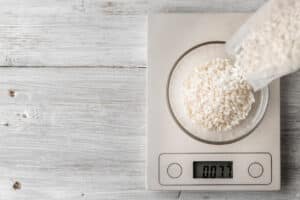Me: “Tell me about your goals?”
Potential Client: “I really want to lose some weight.”
Me: “So tell me about your nutrition?”
Potential Client: “I eat really clean, organic whole foods, I just need to start training more because I am gaining weight.”
I can’t count the times this scenario plays out during a consultation. Just recently I met with potential client that had a ton of nutrition questions. He said he ate clean about 5 times in 10 minutes. I also heard the words organic, complex, and whole foods numerous times. As we talked about nutrition, he became confused and slightly distraught when I told him he had to eat less to lose the weight. I told him I thought it was great he is eating high quality foods, that wasn’t going to help him see the scale go down. As I broke down calories for him and gave him some goals to hit around the numbers of grams of fats and carbs to eat he said “but I can eat avocados because they are healthy fats, right?” Without a pause I said, I don’t care how healthy, clean, or organic your fats are they are still calories. He visually looked upset and put off. The truth hurts sometimes and we have been inundated by so much information on the internet that our truth is skewed. There is an thought process that eating quality foods will some how translate to weight loss. I wasn’t telling him to eat junk food, just that fats from avocados, almonds, and olive oil are just…calories just like calories from butter and steak.
 Yes, eating avocados is better than eating lard out of a can for our cardiovascular health, but if we want the scale to drop, we have to acknowledge that fat still provides 9 calories per gram regardless of the form it comes in. Whether its clean, dirty, or whatever adjective you want to attach to it, the caloric load is the same. The same goes for good carbs vs bad carbs, clean vs junk, organic vs processed. These adjectives we like to attach to foods may make a difference in overall health, but if we want the scale to go down we must look at calories.
Yes, eating avocados is better than eating lard out of a can for our cardiovascular health, but if we want the scale to drop, we have to acknowledge that fat still provides 9 calories per gram regardless of the form it comes in. Whether its clean, dirty, or whatever adjective you want to attach to it, the caloric load is the same. The same goes for good carbs vs bad carbs, clean vs junk, organic vs processed. These adjectives we like to attach to foods may make a difference in overall health, but if we want the scale to go down we must look at calories.
There seems to be some sort of comfort to ones self that they are eating organic homemade avocado dressing over a store bought bottle of ranch dressing. Whether you cook your food in avocado oil or butter, the amount of fat you cook it in matters when you want to lose weight.Period. Whether you are eating Fruity Pebbles or Yams, 1 gram of carbs equals 4 calories. This doesn’t mean eat garbage food, but it does mean that calories must be looked at to lose weight. When weight loss is the focus, portion control is more important that quality control.
How Much Should You Eat to Lose Weight?
As for the amount of calories you should be eating for weight loss that is an entirely different topic, but for most people eating just slightly above your basal metabolic rate is the best place to start. Here is a link to a free online BMR Calculator. There is a lot of variability to this, but in general if your BMR is 1800 calories and you are not very active, it is probably what you should be shooting for. Even if you are moderately active and training a few days per week, you don’t need to fuel up much past your BMR if weight loss is the goal. I will have to write a completely different article on this topic, but quantifying food intake is something everyone should have some experience with and offers valuable insight to people on how much they are actually eating vs how much they think they are eating.
